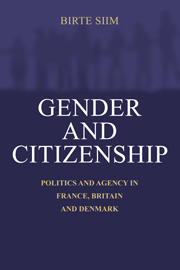Book contents
- Frontmatter
- Contents
- List of Tables and Figures
- Preface
- Abbreviations
- Introduction: Feminist Rethinking of Citizenship
- 1 Towards a Gender-sensitive Framework of Citizenship
- 2 Theories about Citizenship
- 3 Feminist Approaches to Citizenship
- 4 Gender and Citizenship: The French Case
- 5 Gender and Citizenship: The British Case
- 6 Gender and Citizenship: The Danish Case
- Conclusion: Towards a Contextualised Feminist Theory of Citizenship
- Appendix
- Notes
- Bibliography
- Index
3 - Feminist Approaches to Citizenship
Published online by Cambridge University Press: 05 November 2011
- Frontmatter
- Contents
- List of Tables and Figures
- Preface
- Abbreviations
- Introduction: Feminist Rethinking of Citizenship
- 1 Towards a Gender-sensitive Framework of Citizenship
- 2 Theories about Citizenship
- 3 Feminist Approaches to Citizenship
- 4 Gender and Citizenship: The French Case
- 5 Gender and Citizenship: The British Case
- 6 Gender and Citizenship: The Danish Case
- Conclusion: Towards a Contextualised Feminist Theory of Citizenship
- Appendix
- Notes
- Bibliography
- Index
Summary
The notion of citizenship as well as the meaning of citizenship for women is contested. Carole Pateman's paradigmatic work was the starting point for the feminist rethinking of citizenship based on a critique of the public/private divide (1985, 1988, 1989). During the past ten years the feminist debate about citizenship has highlighted the contradictions between the general principles of freedom, equality and fraternity/solidarity in the public, political sphere and the continuing fact of sexual inequality. Feminist scholarship claims that women's exclusion from the public, political sphere is to some extent ‘determined’ by structural inequalities in the family and in the labour market. Feminist scholars disagree about definitions of power and about the meaning of the public and the private sphere as well as about visions for a full citizenship for women.
The feminist debate about ‘equality and difference’ is connected with the question of citizenship because they both refer to ideas of justice, political participation, power and equality of rights (Bussemaker and Voet 1998: 283). There is a tension in feminist scholarship between visions based on gender equality and visions based on sexual difference. The feminist approaches to citizenship have been inspired by the great philosophical traditions, although at the same time they transcend them. The diversity within feminism is great because the major philosophies are represented within it (Kymlicka 1990: 238).
In what follows I have summed up important differences between the feminist approaches to citizenship in three models:
- Type
- Chapter
- Information
- Gender and CitizenshipPolitics and Agency in France, Britain and Denmark, pp. 31 - 43Publisher: Cambridge University PressPrint publication year: 2000



